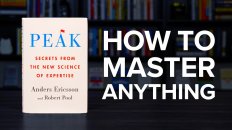We all have an inner voice that we can use to evaluate our actions, learn from past mistakes, and better prepare for the future. Unfortunately, all too often, this voice turns into a stream of negative thoughts and emotions. And, rather than help us improve, it can hold us back by causing rumination, anxiety, and even self-sabotage.
Chatter by Ethan Kross is about how to tame and properly harness your inner voice. It covers practical tips for enjoying the many benefits of self-reflection and introspection while greatly reducing unproductive and negative self-talk. So, if you have a harsh inner critic that is stifling your growth or holding you back in life, this book can help.
1. While Introspection Is Often Helpful, Chatter Is Not
Our inner voice gives us the ability to imagine, remember, and reflect on choices and experiences. It provides us with the freedom to mentally time travel by returning to past memories or imagining future scenarios. By engaging in this kind of introspection, we can improve our ability to learn, grow, and adapt to new information and experiences.
However, not all introspection is helpful or productive. Chatter is the dark side of introspection. It occurs when we get stuck in a loop of negative thoughts or emotions, which hurts our ability to reason logically, solve problems, or control ourselves. As a result, it can prevent us from finding real solutions to life’s challenges.
For example, chatter can hurt our ability to perform complex skills like public speaking or throwing a fastball pitch. It does so by causing us to narrow our focus on individual aspects of an otherwise automatic or learned ability. In other words, rather than being fully engaged in the activity itself, we become distracted with individual actions and fail to perform at our best.
Chatter can also cause us to ruminate about the past, worrying about the future, or be indecisive in the moment. Once again, this is often a result of narrowing our focus and becoming obsessed with minor details. In short, we lose perspective.
2. Create Mental Distance To Get A Better Perspective
Studies show that diverting our attention away from problems can improve the way we feel. Unfortunately, the downside of this approach is that it’s only a short-term fix. The negative feelings remain and are ready to be activated again in the future.
The key to overcoming chatter is not to avoid introspection or ignore our inner voice. Instead, it’s to manage the conversation more effectively. Put simply, we can use our thoughts to change our thoughts, rather than trying to hide from them.
The best way to combat chatter is to create mental distance. While this alone won’t solve our problems, doing so helps counteract the narrowing of attention associated with chatter. In other words, it helps us gain the perspective we need to think more clearly and tackle life’s challenges more effectively.
Unfortunately, we don’t normally see ourselves with the same distance and insight with which we can see others. Have you ever noticed how easy it is to offer practical advice to someone else caught in negative thoughts or emotions? The solution often seems obvious to those that are not experiencing the chatter firsthand.
Research indicates that you can teach people to think wisely, regardless of their age, by creating distance. The ability to step outside of ourselves by creating mental distance is a powerful way to improve our thinking and decision making.
3. Seven Powerful Techniques For Creating Distance
Fortunately, there are proven strategies for creating mental distance. Let’s explore seven great options that you can use when dealing with chatter in the future:
- Use Distanced Self-Talk – Use your name when thinking about yourself to gain emotional distance. For example, instead of thinking, “Why am I distracted this morning?” I might ask myself, “Why is Rick distracted this morning?”
- Imagine Advising A Friend – What would you recommend to a friend if they were dealing with the same experience or challenge? Separating yourself from the issue makes it easier to come up with better insights or advice.
- Broaden Your Perspective – Compare the experience or challenge with more significant difficulties that you or others have faced in the past. This is a great way to zoom out and avoid overestimating something’s importance.
- Reframe your experience as a challenge – Instead of interpreting a situation as a threat or annoyance, consider it a personal challenge.
- Reinterpret your body’s chatter response – View natural bodily reactions to stress (rapid breathing, pounding heart, or sweaty palms) as excitement or natural preparation to take on a challenge.
- Engage in mental time travel – Think about how you will feel about the situation in a month, a year, or even further into the future. Will it still matter? Remind yourself that your current emotions are only temporary.
- Create order in your environment – Chatter is often associated with a sense that we are losing some control. We can counteract this by tidying up, making a list, or creating a ritual to perform before or during chatter-inducing situations.
Note: The book covers additional techniques for combatting chatter, including methods for helping others that are caught up in negative thoughts and emotions. I recommend you read “The Tools” section in Chatter by Ethan Kross for the complete list.
Beyond The Summary of Chatter by Ethan Kross

If you want to learn more about taming chatter and properly harnessing your inner voice, I recommend that you pick up a copy of Chatter by Ethan Kross on Amazon or Apple Books.
For other great reads, consider checking out my lists covering the best productivity books, the best self-improvement books, and the best business books.
You can also subscribe to The Rick Kettner YouTube Channel or The Rick Kettner Podcast to get updates about future book summaries and reading lists.
Do You Have A Question Or Comment?
Please visit the Chatter book summary video on YouTube to share your thoughts in the comment section.


